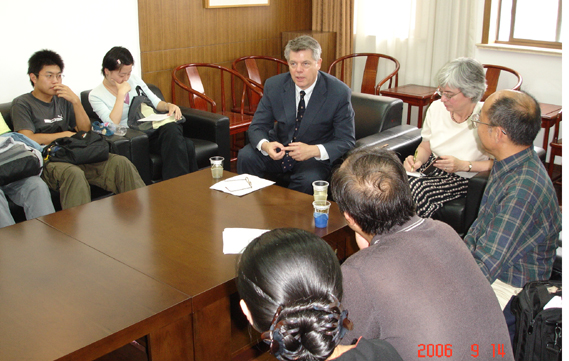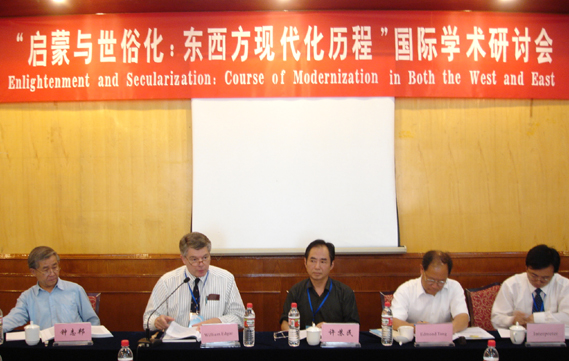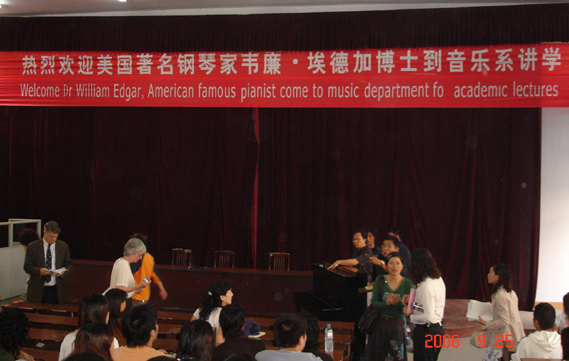


A painting entitled "Hold On," by Liu Xiaodong (1999) shows a young man in his thirties grasping the handrail of a balcony. It resembles the gymnast's parallel bars, but he is no athlete. Rather, wearing glasses and somewhat thin, he looks vulnerable. In a garden below two elderly figures are shown wandering in their confine. The outline of a city is perceived in the distance. Li Puwen comments, "amidst the din and bustle of the city, what people feel is nothing but fatigue, nothing but the need to 'hold on'." (Chinese Cross Currents., Ricci Institute, I/3, 2004, p. 8). Yet city-dwellers do expect a brighter future, one worth all the sacrifice to live there: the noise, the bustle, the endless construction, the impersonal neighborhoods, the loss of intimacy. To be sure, there is a certain excitement and promise about living in modern China. The Olympics are coming to Beijing in 2008, and the World Expo to Shanghai in 2010. All eyes will be on this vast country.
But the threat to China's future is to grow economically but not spiritually. The principal challenge for the next few decades is surely the need for meaning and purpose. The poet Cheng Zhi has said, "Today, from Beijing to the regions, China is a desert of beliefs." We can confirm this to a point. Many Chinese people we met profess no faith, although they are certainly open for discussion. And as our colloquia involved the study of religion, we met many who were Christians, and others who were quite drawn to Christian faith, albeit often for practical reasons. Others are interested in Buddhism, Taoism or Confucianism, though with varying degrees of personal engagement. And although the number of registered Christians is in the tens of millions, the number of unregistered Christians (the House Church) may be as high as 80 million. This time our contacts were limited to the academic world, where is it acceptable to be a believer, though not always the best investment for one's career. For example, Professor *** of Fudan University in Shanghai told us he could not in good conscience join the Communist Party, because of its requirement of atheism. He is willing to take the consequences. At the same time, the professor also told us David Aikman's book, Jesus in Beijing, had done a great deal of harm. We garnered opinions such as these from various friends, often getting a very different take on the same question. So much to learn!
Two colloquia:
The major purpose for our visit was to participate in two important colloquia. The first was held in the large university of Wuhan, in Hubei Province (Sept. 17-20). The title was, Enlightenment and Secularization: the Course of Modernization in Both the West and East. Jointly hosted with the University of Birmingham's Religion Department, it was absolutely fascinating. Besides the 30 papers (plus 3 by graduate students) great benefit was derived from the personal interactions. These friendships are surely enduring. And, of course, there was marvelous ceremony and a great sense of occasion, amidst the informality and fun-loving of the Chinese. Everything was translated back and forth from Mandarin to English and vice-versa, making the experience quite agreeable. A handsome booklet was produced with all the papers in both languages. I put one on deposite in the Jonathan Chao Center at Westminster.
My own favorite papers were:
Various questions and observations:
The second colloquium was held in two places, Xiangfan and Yichang. The subject was Theological Aesthetics. Though a bit less well organized, and with less translation offered, this encounter was nonetheless extremely important. A variety of papers were presented on various aspects of Western and Asia aesthetics. I don't believe anything quite like this colloquium has ever occurred before. I led off with a paper on The Revenge of the Aesthetic, in which I noted the turnaround in the West about beauty, yet the need to understand its nature more, and to do more in relating it to culture as defined in Genesis 1:26 ff. Again, I'll append it for anyone interested. Many presenters explained what was going on in Asia. A Jesuit from Macau presented the Ricci Institute and its work. It seemed to many that discovering the arts together was a way to begin at the threshold of deeper things (à la Kierkegaard?). This second colloquium was first held in a hotel in Xiangfan, then in an extraordinary resort near Yichang which required going over two long, narrow footbridges over a deep gorge.
Some observations:
Miscellaneous experiences:
Interwoven with the two official meetings were scores of remarkable experiences:
For the future:
These kinds of meetings are critically important. I believe Westminster seminary should do everything possible to promote these kinds of encounters. Zhongxin Wang has a network of contacts in the highest places in the university circles. They will certainly be a crucial part of emerging China. We ought to mount conferences and visits to the extent it is possible for us. Maybe this is something the Westminster Religion and Culture Project could also tie into. Subjects to explore include: the comparison of Christianity to Buddhism; more on the arts; folk religions East and West; Sino-theology evaluated; urbanization and religion East and West; etc. Maybe if enough mutual understanding and promotion of Christian faith occurs, the Chinese can do more than just "hang on." And maybe the West can learn the great lessons of humility and servant-leadership.
A word of thanks:
Barbara and I want to extend our deepest gratitude, first, to the China Christian Scholars Association of North America, second to some of our dear friends, third to Westminster Theological Seminary, for their financial and spiritual support, to make this trip not only possible but enjoyable and very significant. Zhongxin Wang was a tireless, patient, and generous guide throughout. We thank his family for sharing him with us for nearly three weeks.

- End -